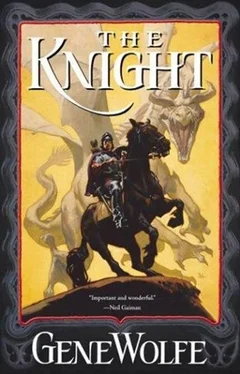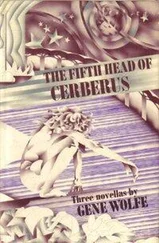Gene Wolfe - The Knight
Здесь есть возможность читать онлайн «Gene Wolfe - The Knight» весь текст электронной книги совершенно бесплатно (целиком полную версию без сокращений). В некоторых случаях можно слушать аудио, скачать через торрент в формате fb2 и присутствует краткое содержание. Год выпуска: 2005, ISBN: 2005, Жанр: Фэнтези, на английском языке. Описание произведения, (предисловие) а так же отзывы посетителей доступны на портале библиотеки ЛибКат.
- Название:The Knight
- Автор:
- Жанр:
- Год:2005
- ISBN:9780765313485
- Рейтинг книги:5 / 5. Голосов: 1
-
Избранное:Добавить в избранное
- Отзывы:
-
Ваша оценка:
- 100
- 1
- 2
- 3
- 4
- 5
The Knight: краткое содержание, описание и аннотация
Предлагаем к чтению аннотацию, описание, краткое содержание или предисловие (зависит от того, что написал сам автор книги «The Knight»). Если вы не нашли необходимую информацию о книге — напишите в комментариях, мы постараемся отыскать её.
The Knight — читать онлайн бесплатно полную книгу (весь текст) целиком
Ниже представлен текст книги, разбитый по страницам. Система сохранения места последней прочитанной страницы, позволяет с удобством читать онлайн бесплатно книгу «The Knight», без необходимости каждый раз заново искать на чём Вы остановились. Поставьте закладку, и сможете в любой момент перейти на страницу, на которой закончили чтение.
Интервал:
Закладка:
“Who-o-o comes?”
You would get married, and I would be in the way all the time until I was old enough to live on my own. The best plan might be for me to stay out at the cabin, for the first year anyway. It might be better still for me not to come home too quickly. Home to the bungalow that had been Mom and Dad’s. Home to the cabin where we had gone to hunt and fish before snow ended all that.
Yet it was spring. Surely this was spring. The stag I had killed had dropped his a ntlers, the grass in the forlorn little garden of Bluestone Castle had been downy and short. What had become of winter?
A lovely, pointed face lit by great lustrous eyes like harvest moons peered down into mine, then vanished.
I sat up. There was no one there except Bold Berthold, and he was fast asleep. The owl had fallen silent, but the night-wind murmured secrets to the trees. Lying down again, I did my best to recall the face I had glimpsed. A green face? Surely, I thought, surely it had looked green.
The old trees had given way to young ones, bushes, and spindly alders when Bold Berthold said, “Here we are.”
There was no town. No town at all.
“Right here,” he waved his staff, “right there’s where the street run. Houses on this side, back to the water. On that other, back to the fields. This right here was Uld’s house, and across from it Baldig’s.” He took me by the hand. “Recollect Baldig?”
I do not remember what I said, and he was not listening anyway. “Uld had six fingers, and so’d his daughter Skjena.” Bold Berthold released my shoulder. “Pick up my stick for me, will you, stripling? I’ll show where we met ’em.”
It was some distance away, through bushes and saplings. At last he stopped to point. “That was our house, yours and mine. Only it used to be Pa’s. Recollect him? Know you don’t recollect her. Ma got took ‘fore you was ever weaned. Mag, her name was. We’ll sleep there tonight, sleep where the house stood, for the old times’ sake.”
I had not the heart to tell him I was not really his brother.
“There!” He led me north another hundred yards or so. “Here’s the spot where I first seen Schildstarr. I’d boys like you to shoot arrows and throw stones, but they run, all of ’em. Some shot or threw first, most just run soon as the Angrborn showed their faces.”
He had stayed, and fought, and fallen. Conscious of that, I said, “I wouldn’t have run.”
He thrust his big, bearded face into mine. “You’d have run too!”
“No.”
“You’d have run,” he repeated, and flourished his staff as if to strike me.
I said, “I won’t fight you. But if you try to hit me with that, I’m going to take it away from you and break it.”
“You wouldn’t have?” He was trying not to smile.
Having convinced myself, I shook my head. “Not if they had been as tall as that tree.”
He lowered his staff and leaned on it. “Wasn’t. Up to that first big limb, maybe. How you know you wouldn’t run?”
“You didn’t,” I said. “Aren’t we the same?”
Long before sundown we had cleared a space to sleep in where the old house had stood, and built a new fire on the old hearth. Bold Berthold talked for hours about the family and about Griffinsford. I listened, mostly out of politeness at first; as the shadows lengthened, I became interested in spite of myself. There had been no school, no doctor, and no police. At long intervals, travelers had crossed the Griffin here, wading through cold mountain water that scarcely reached their knees. When the villagers were lucky, they had sold them food and lodging; when they had been unlucky, they had to fight them to protect their homes and herds.
If the Angrborn had been giants, the Osterlings who sometimes came in summer had been devils, gorging on human flesh to restore the humanity they had lost. The Aelf had come like fog in all seasons, and had vanished like smoke. “Mossmen and Salamanders, mostly,” Bold Berthold confided. “Or else little Bodachan. They’d help sometimes. Find lost stock and beg blood for it.” He bared his arm. “I’d stick a thorn in and give a drop or two. They ain’t but mud, that kind.”
I nodded to show I understood, although I did not.
“You was here with me then, only you didn’t talk so high. Pa raised me, and I raised you. You got to feeling like you was in the way, I’d say, ’cause of me runnin’ a fter Gerda. Prettiest girl ever seen, and we had it all planned out.”
I did not have to ask what happened.
“You went off, and I thought you’d be back in a year or two when we got settled. Only you never come ’til now. How’d you like it where you was?”
I tried to recall, but all that I could think of was that the best times in my life had come when I had been able to get out under the sky, out on a boat or among trees.
“Nothing to say?”
“Yes.” I showed him the arrowheads I had saved. “Since we’ll have a few more hours of daylight, I’d like to fit new shafts to them.”
“Old ones broke?”
I nodded. “When the stag fell. I was thinking that if I could find more wood of the same kind as my bow, my new shafts wouldn’t break.”
“You’d cut one, for a couple arrows?”
I shook my head. “I’d cut a limb or two, that’s all. And if I could find one of last year’s fruits, I’d plant the seeds.”
Laboriously he climbed to his feet. “Show you one, and it ain’t gone.”
He led me into the brush, and kneeling felt through the grass until he discovered a small stump. “Spiny orange,” he said. “You planted it ‘fore you went away. It was on my land, and I wouldn’t let nobody cut it. Only somebody done, when I wasn’t looking.”
I said nothing.
“Thought it might have put up shoots.” He rose again with the help of his staff. “They do, sometimes.”
I knelt, took one of the two remaining seeds from my pouch, and planted it near where the earlier stump had grown. When I rose again, his face was streaked with tears. Once more he led me away, then stopped to wave his staff at the wilderness of saplings and bushes that stretched before us. “Here was my barley field. See the big tree way in back? Come on.”
Halfway there he pointed out a speck of shining green. “There it is. Spiny orange don’t drop its leaves like most do. Green all winter, like a pine.”
Together we went to it, and it was a fine young tree about twenty-five feet high. I hugged him.
It seems to me that I should say more about the spiny orange here, but the truth is that I know little. Many of the trees we have in America are found in Mythgarthr too—oaks and pines and maples and so on. But the spiny orange is the only tree I know that grows in Aelfrice too. The sky of Aelfrice is not really strange until you look closely at it and see the people in it, and (sometimes) hear their voices on the wind. Time moves very slowly here, but we are not conscious of it. Only the trees and the people are strange at first sight. I think the spiny orange belongs here, not in Mythgarthr and not in America.
Chapter 4. Sir Ravd
Lad!” the knight called from the back of his tall gray. And again, “Come here, lad. We would speak to you.”
His squire added, “We’ll do you no hurt.”
I approached warily; if I had learned one thing in my time in those woods with Bold Berthold, it was to be chary of strangers. Besides, I recalled the knight of the dragon, who had vanished before my eyes.
“You know the forest hereabout, lad?”
I nodded, giving more attention to his horse and arms than to what he said.
“We need a guide—a guide for the rest of this day and perhaps for tomorrow as well.” The knight was smiling. “For your help we’re prepared to pay a scield each day.” When I said nothing, he added, “Show him the coin, Svon.”
Читать дальшеИнтервал:
Закладка:
Похожие книги на «The Knight»
Представляем Вашему вниманию похожие книги на «The Knight» списком для выбора. Мы отобрали схожую по названию и смыслу литературу в надежде предоставить читателям больше вариантов отыскать новые, интересные, ещё непрочитанные произведения.
Обсуждение, отзывы о книге «The Knight» и просто собственные мнения читателей. Оставьте ваши комментарии, напишите, что Вы думаете о произведении, его смысле или главных героях. Укажите что конкретно понравилось, а что нет, и почему Вы так считаете.









